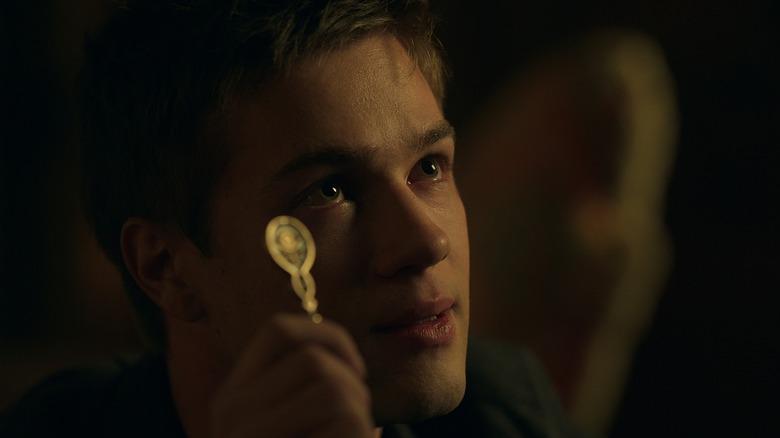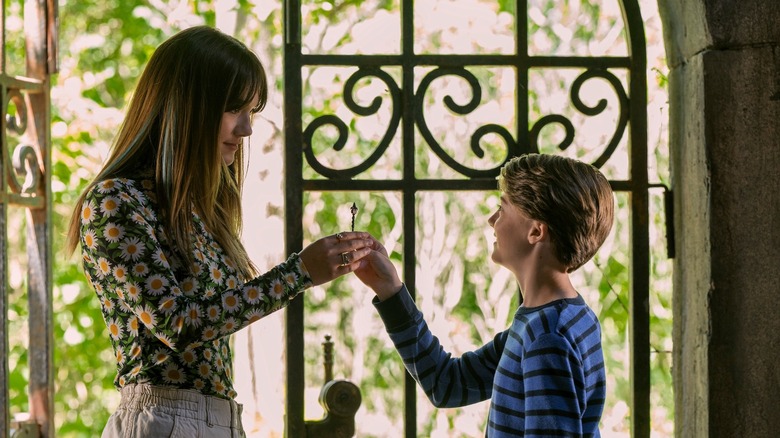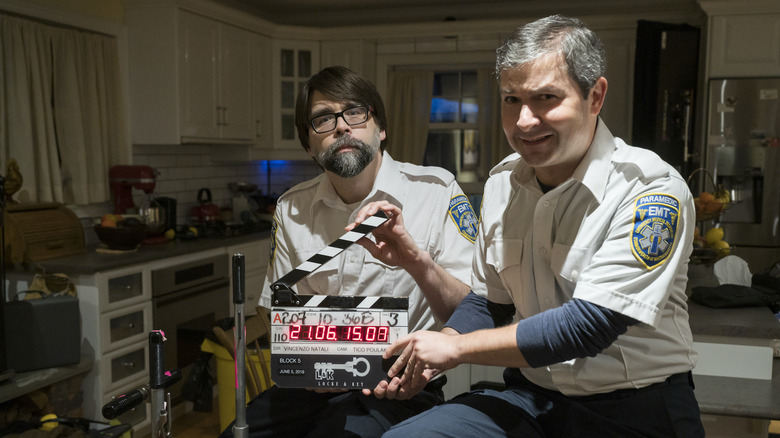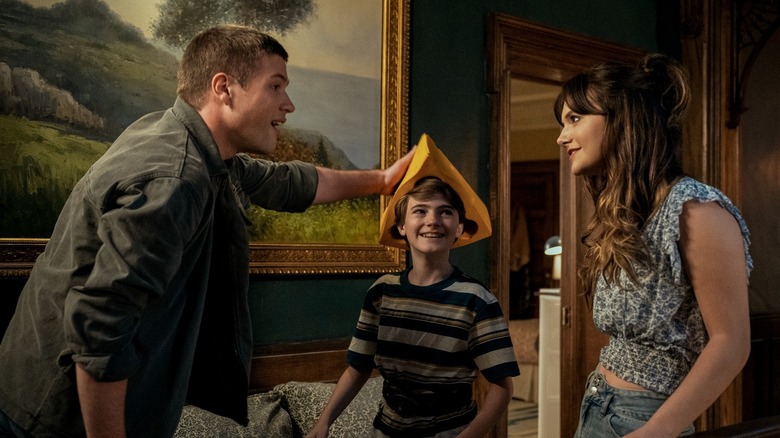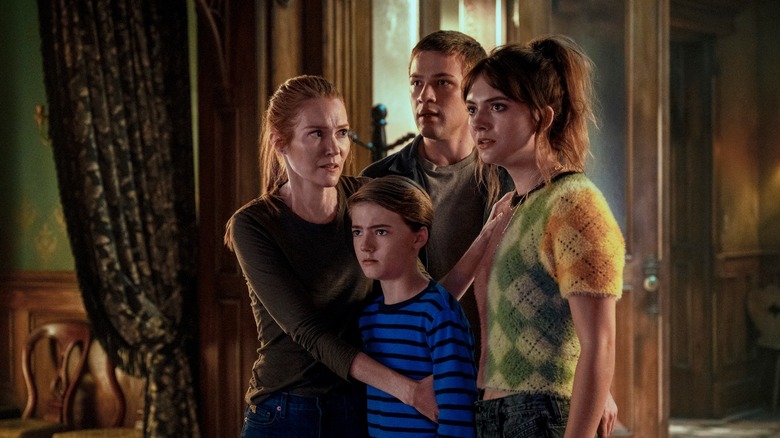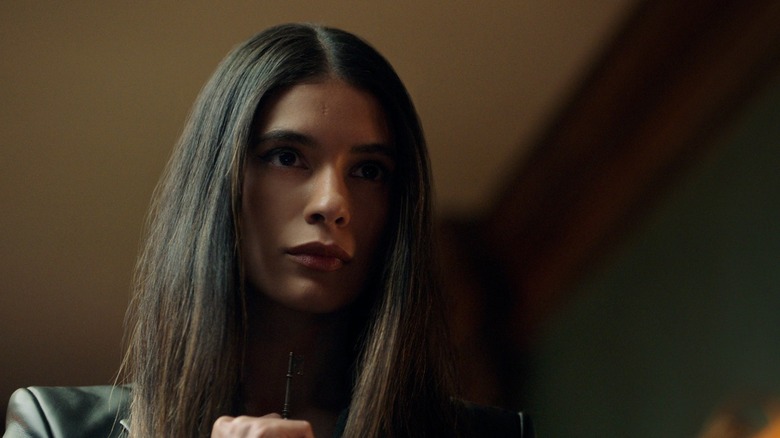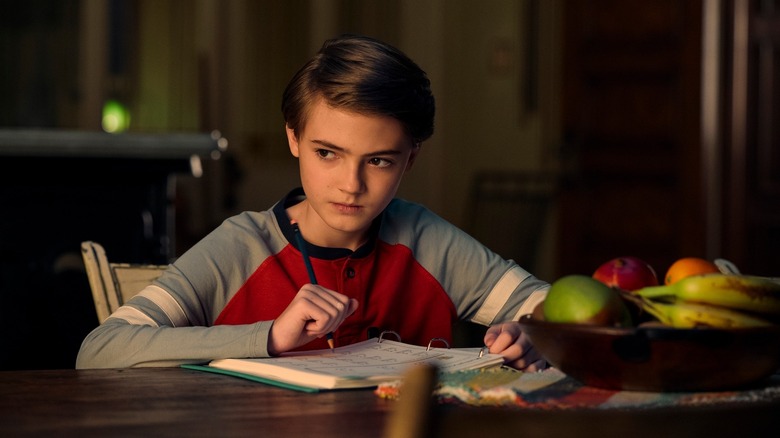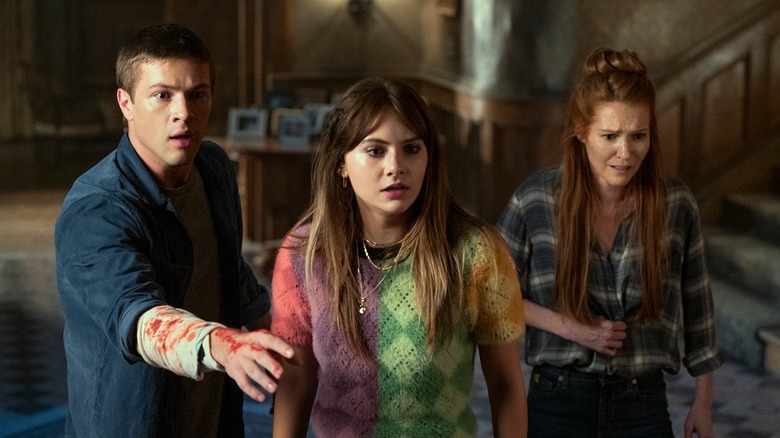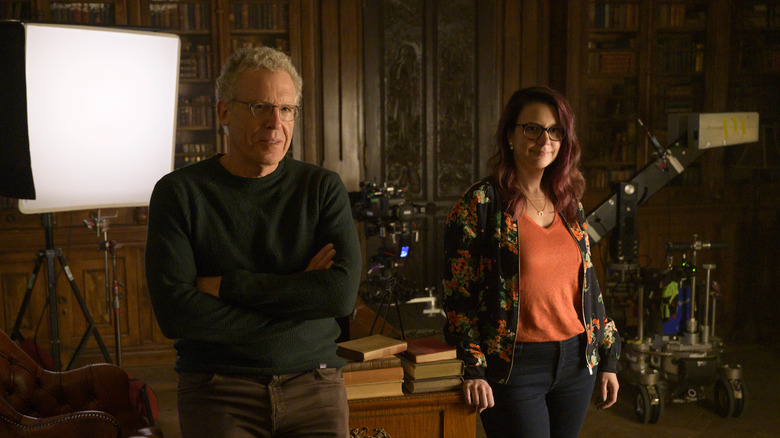Showrunners Carlton Cuse And Meredith Averill Talk Finally Bringing Locke & Key To The Screen - Exclusive Interview
Joe Hill and Gabriel Rodriguez's comic book series "Locke & Key" has almost been adapted as a TV show a number of times (via Deadline), but it wasn't until early 2020 that it finally made it to the screen as a series on Netflix. Developed by Carlton Cuse and Meredith Averill along with Aron Eli Coleite, "Locke & Key" was often compared to the streaming service's other fantasy-horror series focused on young characters, "Stranger Things." However, "Locke & Key" is very much its own thing.
With a whimsical tone that emphasizes the magic of the premise, the show centers on the Locke family — mother Nina (Darby Stanchfield), eldest son Tyler (Connor Jessup), middle daughter Kinsey (Emilia Jones), and youngest child Bode (Jackson Robert Scott) — who move from Seattle to Matheson, Massachusetts, to take up residence in the Locke ancestral home following the murder of patriarch Rendell (Bill Heck). Once there, the children learn the house holds a number of keys, each unlocking a different magical power. It's a discovery that not only connects them to their father, who used the keys when he was younger, but also puts them on a collision course with a demonic force that wants the keys for itself.
Now, with the release of its 3rd season, "Locke & Key" has come to an end after 28 episodes. Those episodes tell the complete story of the Lockes' adventure with the keys. Ushering the show through that journey were executive producers and showrunners Cuse and Averill. In an exclusive interview, Looper spoke to the pair about making the show, including the decision to bring it to a conclusion, its unique tone, and how they feel about finally bringing the story of "Locke & Key" to the screen.
Deciding to end the show
It was announced a few months ago that this season would be "Locke & Key"'s last. Why did you make the decision to end the show now?
Meredith Averill: We felt that we had come to a natural endpoint with the stories that we wanted to tell with our characters, particularly the younger characters and their evolution. We had done an enormous part of the original, the source material we used, and we have our own original ideas as well, and it felt like a natural endpoint for us to tell at the end of the 3rd season.
Carlton Cuse: We didn't want to overstay our welcome, and also, it feels like in the world that we live in now, a show that is 28 episodes in total has good, long-term streamability. I find myself daunted by shows that are longer. [With] 40, 50-plus episodes, it's hard for me to engage. We wanted to tell the story without resorting to filler or getting into cul-de-sacs narratively that were not progressive.
Joe Hill encouraged the creators 'to not do a literal adaptation'
Did you have a mandate early on about how faithful you wanted to stay to the comic?
Cuse: Joe Hill from the very beginning strongly encouraged us to not do a literal adaptation. A literal adaptation would be boring; it should be its own thing. Joe was very on board right from the beginning that we were going to visit a lot of the same bus stops as the comic but do it on our own terms, with some alterations to the narratives, additional characters — our own exploration of the journey to get to those bus stops.
The comics exist for people who want to see the way it was originally put together by Joe and Gabe. I think it's fun that you can watch the show and it's similar, but you're not going along by rote; you're getting a new experience. As storytellers, we felt liberated, and it gave us the opportunity and challenged us to figure out how we could best tell our version of this story on the screen, which necessitated taking different approaches to things than in the comic.
Joe is an executive producer on the show. Did he have any strong opinions about ending the show or how to end the show this season?
Averill: No, he's been very supportive along the whole way. When we told him that we were thinking this would be the end, he completely understood our reasons for that, and in fact, he actually co-wrote the penultimate episode with Carlton. So he's been on board and looped into everything. We end our show in a different way than the [comic] ends, but he really loved the way that we chose to end it. He's been amazing.
The impact of the pandemic
The show debuted right as the pandemic was starting, and it's now ending when we're sort of back to normal. How has that impacted the production and what the show has meant to you both?
Cuse: It impacted the show massively in that we had to produce two seasons of the show during the pandemic back-to-back. It was one of our greatest accomplishments that we were able to do that without any significant COVID. We had a few outlier cases, but we didn't have any breakouts or shutdowns. We took our responsibility to try to keep everybody on the crew and the cast safe very seriously, and they all did too. Everybody on the cast and the crew were very rigorous about not engaging in the behavior that would lead to an outbreak.
We made the show and we were doing that initially before there was even a vaccine. So it was a bit more perilous, and fortunately, we were also working in Canada, where there was a lot less COVID for a long time. It bonded everybody to be making a show that everybody loved to be making but with the shared adversity of having to be careful because there was a pandemic going [on]. Everyone ended up more deeply connected because of that than they would have [otherwise].
Averill: Definitely, and we had a bit of an accelerated schedule with Seasons 2 and 3. We shot them back-to-back, and also the writers' rooms were back-to-back. It led to this unique situation where we were actually writing and breaking Season 3 before we even started shooting Season 2, which is really unique and in some ways very difficult. But in some ways it was beneficial because it did allow us to go back if there was something, as we were breaking in Season 3, we hadn't shot yet Season 2, so we were like, "Oh wait, we can go back and lay in this little detail that's going to pay off later." So there was a benefit to that also.
'Grief hangs over this story'
Because the release schedule has paralleled the pandemic, the show's themes of loss and trauma are very resonant with what we've been experiencing. Why was it important for you to explore the way the family is bonded through grief?
Cuse: Our whole story has many layers. One of them is this is a story about a family where the father's been murdered, so grief hangs over this story right from the very beginning. They're moving to Matheson, back into his family's ancestral house, because he's been murdered, and there's mysterious circumstances about his murder.
I don't think grief ever vanishes, but we wanted to get to a place where the characters had at least processed their loss in a way and come to terms with it in a way that was at least a significant step forward and that they were in a different place than when they first arrived in this town. That plays out in terms of their relationship with these keys, which are obviously very connected to their father and to the trauma of his death, and so there's this fantasy element of the story, but it's never far removed from the emotional trauma of the characters that drives the narrative.
Deciding on the show's distinctive tone
The tone of "Locke & Key" is so distinctive. It's very whimsical and magical, even though it includes horror elements too. Why did you decide that was the tone that would work best for the show?
Averill: It was really important to us to be able to balance those tones, as someone who's worked on pretty dark horror before, which I love. When Carlton and I first sat down to talk about our version of the adaptation, we and Netflix were all really attracted to telling the story in a way that would be more inclusive for younger audiences and older audiences that could watch it together. We felt like that made sense with this subject material because you've got all these great elements. It's a family drama, it's a mystery, but there's also teens going through teen stuff, and you don't want to constantly be wallowing in the horror or the grief. You want to find the balance there. So that was a challenge for us, but we felt [it] was also really important for the show.
It's also important for our villains to not be too mustache twirly or dark or one-note. That's why we tried to write Dodge, whether it was played by Laysla [De Oliveira] or by Griffin [Gluck], and this season Gideon [played by Kevin Durand] and his two henchmen with a little bit of a smirk, a little bit of humor, because we felt that was really important for the tone of the show.
Jackson Robert Scott's impressive work as Bode
I have to give a shout-out to Jackson Robert Scott, who plays Bode. He's always been impressive, but this season, his work is exceptional. How have you seen him grow as an actor and develop his performance as the seasons have gone on and you've given him more to do?
Cuse: We gave him more to do because we believed in him. Jackson, he's really grown up on this show, and as he himself said, "I'll never forget 'Locke & Key.'" If you think about it, he's just about to turn 14, so he's been working on this thing — and was the one element that carried over from an earlier incarnation of this show that I did with Hulu before Meredith joined — so he's been working on this thing for six years of his 13 years on the Earth, so it's a really significant part of his life.
I think the stuff that we gave Jackson to do, without spoiling it, this season was one of the things that just delighted Meredith and me to no end. We had this idea, and we had so much fun doing it and then watching how Jackson took to it. That whole thing was Meredith and I loved that, and Jackson nailed it. It was fun to see him do something else because he plays the precocious adventurer, and he does that really well, but we wanted to give him this darker, more nefarious turn that was going to be fun for the audience. He's turning into a young man and has got a lot of really good acting under his belt. It's been a wonderful journey to watch him grow up as we've made the show.
The challenge and hope of telling a serialized story
The show is highly serialized from season to season to season. You really have to start at the beginning and go all the way through. You both have previous experience on very serialized shows, especially Carlton famously with "Lost." What did you learn from those experiences that you've brought to "Locke & Key"?
Cuse: Serialized storytelling is wonderful in that it allows you to go deep and to keep increasing the complexity of issues for the characters. But obviously, it has a challenge in the streaming world, where people have to wait a long time between seasons and they're watching other stuff and they may not remember all the details. So hopefully, people will recap if they don't remember everything that's happening in "Locke & Key." Or maybe our biggest hope is that there's a whole audience out there that's waiting for the show to finish and then will just binge it, in the way that certain shows have caught fire later in their lives, like — they're not quite analogous because "Breaking Bad" was still going, but it took off at a certain point — or "Shameless" when it went to Netflix.
I hope there is an audience out there that, now that the entire thing is out, will be like, "Hey, this is a great time to watch all 28 episodes," because I think it's going to be a great binge altogether. It's fun to watch each season, but I really do believe that "Locke & Key" is well suited for being binged.
'I'm immensely proud of everything that we accomplished'
Fans of the comic have been wanting this as a film or TV adaptation for a very long time. There were a lot of starts and stops along the way. Now that you've put out a complete "Locke & Key" TV series and it's released and it's done and fans have the opportunity to experience the story on screen, how do you feel?
Averill: It's bittersweet because it's been a world that I've loved living in and that's the end of our tale. But I'm immensely proud of everything that we did. I can't look back and say, "I wish we had..." I have zero regrets, and I am looking forward to whatever's next, but I feel like I'm immensely proud of everything that we accomplished [and] also that we've had the support of Joe Hill and Gabriel Rodriguez throughout it all. We've been able to do our own version of it, but their support feels like the highest compliment that we could have been paid, that they feel like we did a version that was still in the spirit of their story, because it all started with them.
Carlton, what about you?
Cuse: I'm sad that it's over because every time you make a show, you build a world on screen, but then you also build a world behind the scenes, and this has been a really special one. Meredith and I just had a party here at my house on Saturday for everyone, who mostly we haven't seen since we wrapped in Lunenburg [in Canada] last fall, and everybody just picked right up where they were. Everybody's so connected, and it was so much fun to see everybody. It's sad when shows end and those communities that are built around shows also dissipate, and yeah, you run into people downstream, but it's not the same as that day-to-day camaraderie of working on the show together. So that's the part that's hard.
I'm very happy with the arc of the show that Meredith and I constructed and that we have this 28-episode story that goes from beginning to end. I think it's a really good show. I think it'll stand the test of time. I really hope people who have been watching it will enjoy the ending, [and] I really do hope there's a whole other group of people who will be like, "Yeah, I think I'm going to check that out and start in." Because I think it's pretty addictive, and it ultimately ends up as a very rewarding watch, at least that's our hope.
All three seasons of "Locke & Key" are available on Netflix.
This interview was edited for clarity.
